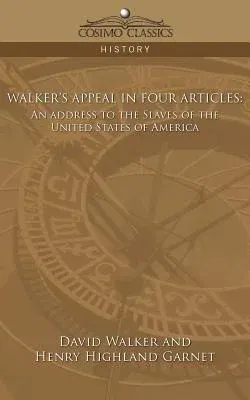The whites want slaves, and want us for their slaves, but some of them
will curse the day they ever saw us. As true as the sun ever shone in
its meridian splendor, my colour will root some of them out of the very
face of the earth. They shall have enough of making slaves of, and
butchering, and murdering us in the manner which they have. -from
Walker's Appeal in Four Articles The rage of blacks in slavery-era
America is not something we today must merely imagine: we can read their
angry words in documents like these. David Walker, born to a free black
woman, was by the 1820s a leading black intellectual and a proponent of
black unity as a necessary precursor to throwing off the shackles of
slavery. His Appeal, published in 1829, warned of a violent and bloody
slave insurgency, and startled even abolitionists with its vehemence. He
was rehabilitated by Henry Highland Garnet two decades later, when he-a
runaway slave since childhood-republished it, in the single 1848 volume
of which this is a replica, along with his own Address to the Slaves of
the United States of America. Garnet's call for massive slave uprisings
had been similarly rebuffed several years earlier, but worsening
tensions between the North and the South, and between slave owners and
abolitionists, created an atmosphere in which rising militancy was more
welcome. In their passionate writings, the bitter wrath of Walker and
Garnet echoes across the decades, reminders of the shameful past that
continues to haunt America as a nation to this day. DAVID WALKER (c.
1780s-1830) was a contributor to Freedom's Journal, the first black
newspaper in America. HENRY HIGHLAND GARNET (1815-1882) was editor of
the black newspaper The Clarion, and, after the Civil War, served as the
president of Avery College and as an advisor to President James
Garfield.


